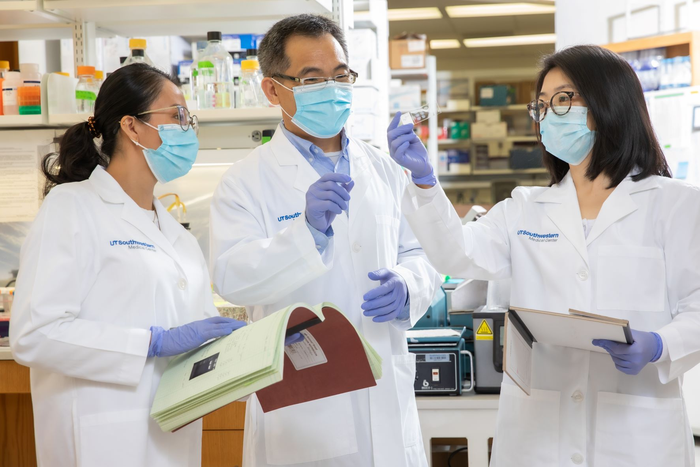UT Southwestern stem cell scientists find that stringent lineage tracing is crucial for studies of nerve cell regeneration. Their results, which are published in Cell, show that this tracing is far from routine in the field and suggest that earlier studies reporting “striking” regeneration results must be reexamined.

Credit: UT Southwestern Medical Center of Dallas
UT Southwestern stem cell scientists find that stringent lineage tracing is crucial for studies of nerve cell regeneration. Their results, which are published in Cell, show that this tracing is far from routine in the field and suggest that earlier studies reporting “striking” regeneration results must be reexamined.
Lineage tracing, which is a fundamental approach in developmental biology, refers to tests used to map out the progeny – or descendants – of a given cell in an organism.
Lineage tracing is also central to the field of stem cell biology, so it was surprising to learn how often such testing had been omitted, the authors write in the newly published study in Cell, one of the world’s most highly regarded scientific journals. The two corresponding authors are Chun-Li Zhang, Ph.D., a Professor of Molecular Biology and a W.W. Caruth, Jr. Scholar in Biomedical Research; and Lei-Lei Wang, Ph.D., an Instructor of Molecular Biology and member of the Zhang lab, which studies nerve cell regeneration in the brain and spinal cord.
“We have from the start employed the most stringent methods to analyze nerve cell regeneration. It was therefore astonishing to read a number of other papers – including some that make phenomenal claims – that failed to do careful analyses,” said Dr. Zhang, a member of the Hamon Center for Regenerative Science and Medicine at UT Southwestern.
After running dozens of experiments using a range of protocols, the researchers identified which specific lineage tracing assays appeared most robust and reliable – the so-called gold standard tests. “We employed the currently available lineage tracing assays. No new ones were developed,” Dr. Zhang said. The scientists also identified tests that were less likely to provide precise results.
The study concludes by listing reliable lineage tracing tests and strongly recommending these assays be used in all laboratories doing nerve cell regeneration research. “The methods we list are straightforward to establish in a laboratory, and we believe they should always be used,” he said.
Dr. Zhang received his Ph.D. in genetics and development from UT Southwestern Medical Center, where he worked on muscle development and heart disease. He conducted postdoctoral research on neural stem cells as a Howard Hughes Medical Institute Fellow of the Life Sciences Research Foundation at the Salk Institute in La Jolla, California.
At UT Southwestern, Dr. Zhang’s laboratory has reported several advances in neural stem cell biology, such as regeneration of the brain and spinal cord in mice following injury. The Scientist recognized his lab’s work on cell fate reprogramming in live animals as one of 2014’s Big Advances in Science. He won a prestigious National Institutes of Health Director’s New Innovator Award in 2009.
Using rigorous lineage tracing, the team of Drs. Wang and Zhang reported in 2018 that while attempting to transform a type of brain cell known as a glial cell into a neuron, they instead reprogrammed mature inhibitory neurons into a different type of neuron that produces the neurotransmitter lost in Parkinson’s disease. Their study indicated that the brain’s neurons were more malleable in adulthood than previously thought.
Earlier this year, they reported in Cell Stem Cell that the latent neurogenic potential of glial cells can be leveraged to produce new neurons and lead to functional recovery after spinal cord injury in mice.
UTSW co-authors include: Carolina Serrano Garcia, Xiaoling Zhong, Shuaipeng Ma, and Yuhua Zou.
The Welch Foundation supported the study (I-1724), as did the Decherd Foundation, the Kent Waldrep Foundation Center for Basic Research on Nerve Growth and Regeneration, the Texas Alzheimer’s Research and Care Consortium (TARCC2020), and the NIH (NS099073, NS092616, NS111776, NS117065, and NS088095).
The authors declare no competing interests.
About UT Southwestern Medical Center
UT Southwestern, one of the nation’s premier academic medical centers, integrates pioneering biomedical research with exceptional clinical care and education. The institution’s faculty has received six Nobel Prizes, and includes 25 members of the National Academy of Sciences, 16 members of the National Academy of Medicine, and 14 Howard Hughes Medical Institute Investigators. The full-time faculty of more than 2,800 is responsible for groundbreaking medical advances and is committed to translating science-driven research quickly to new clinical treatments. UT Southwestern physicians provide care in about 80 specialties to more than 117,000 hospitalized patients, more than 360,000 emergency room cases, and oversee nearly 3 million outpatient visits a year.
Journal
Cell
DOI
https://doi.org/10.1016/j.cell.2021.09.005
Method of Research
News article
Subject of Research
Cells
Article Title
Strict lineage tracing crucial to nerve cell regeneration research, study says
Article Publication Date
27-Sep-2021




